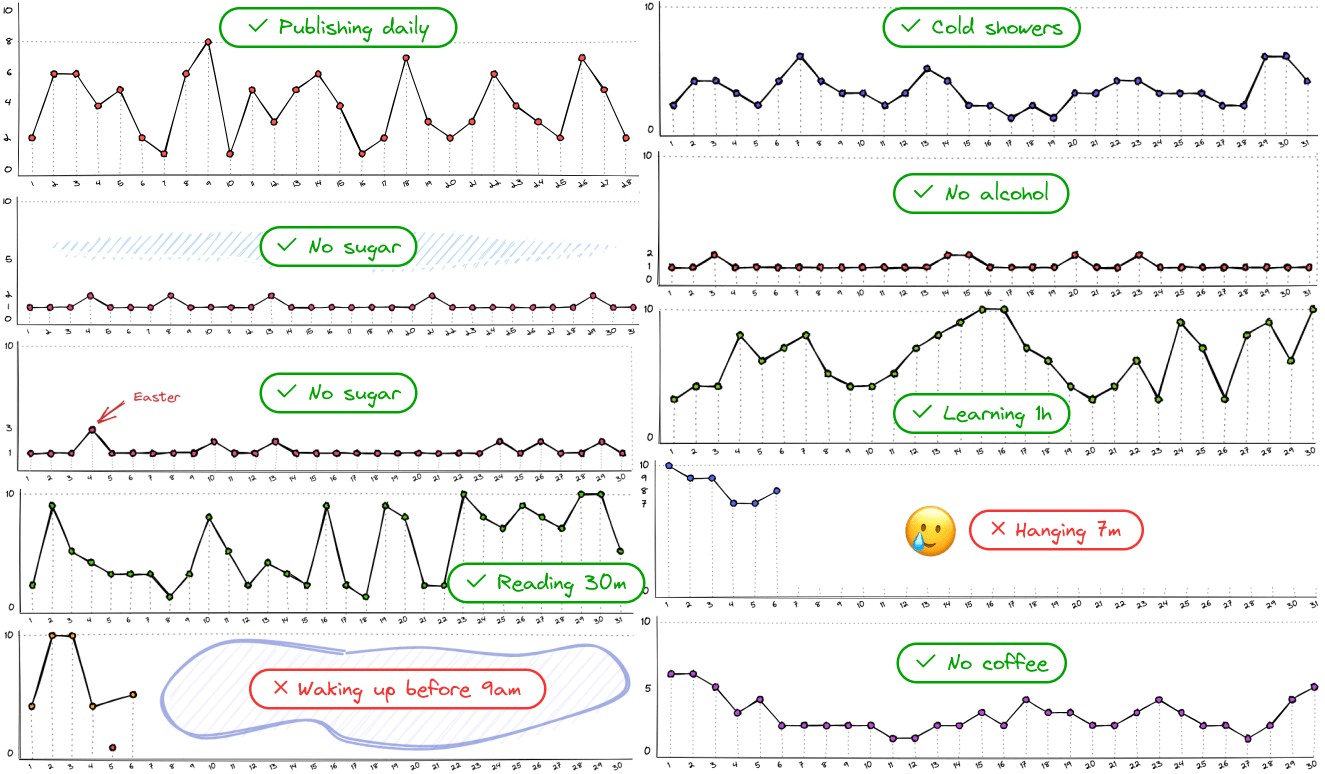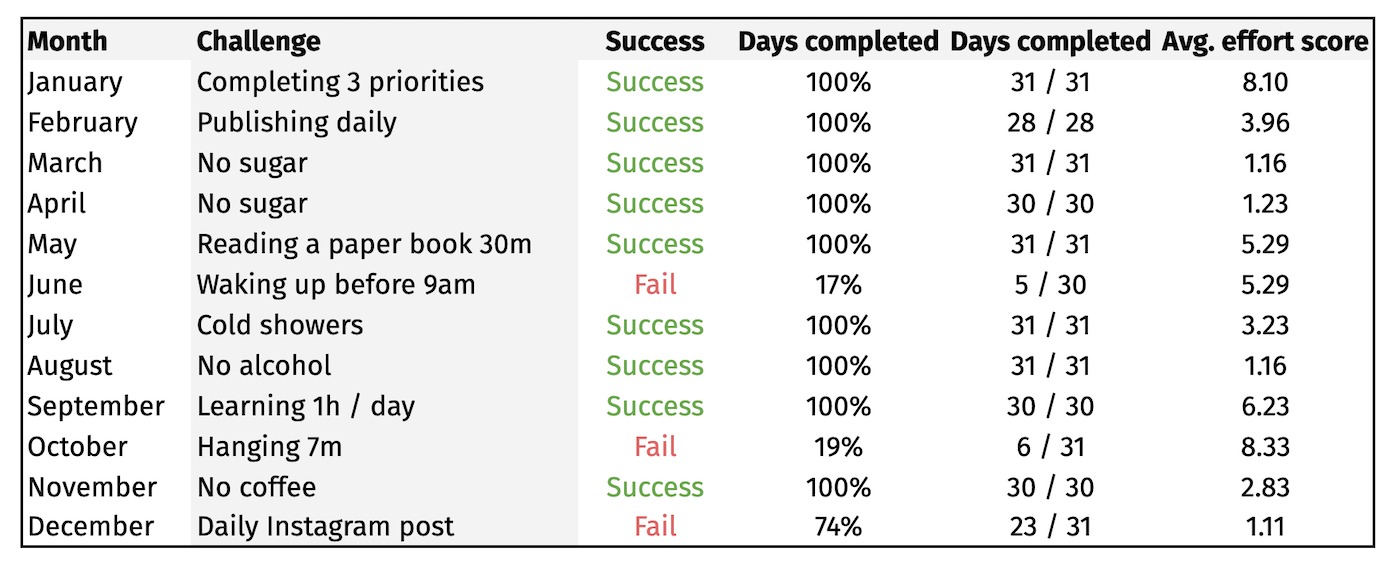Pushing my limits - What I learned from a year of monthly challenges

This article is about the 2021 version of the monthly challenges. I'm doing it again in 2025..
In 2021, I set out on a transformative journey, taking on a new challenge each month to push beyond my comfort zone and build better habits. This reshaped my lifestyle and, surprisingly, seemed to slow the passage of time.
Why did I do it?
Shortly before deciding on the 12 challenges in 12 months, I tried a few challenges, each for one week. I didn't have any particular goal in mind, I just wanted to try something new and to see what happens.
Although a week was an intriguing timeframe to test new habits, it often felt too short for lasting impact. While it's easy to endure a week of discomfort, the habits from these short-lived challenges rarely persisted. In contrast, dedicating a month to each challenge provided more genuine and enduring outcomes.
The 12 challenges
So the plan was born: 12 challenges in 12 months. Each challenge would last for a month, and I would have to complete it every day for the whole month.
When I was planning 12 monthly challenges, I designed them to experiment with different aspects of life. Each challenge was a unique opportunity to break free from bad habits, to explore new ones, and to train self-discipline.
The challenges spanned personal growth, health, and social interaction. They ranged from health-focused endeavors like early risings, daily cold showers, and abstaining from alcohol and coffee, to tasks aimed at boosting creativity and perseverance such as daily publishing, reading, and learning.
I also tried to strike a balance between a "do less of" and "do more of" types of challenges, with 4 and 8, respectively.
Here's the full list, with links to summaries for each month:
- January: Setting 3 priorities for the day and completing them, no matter what
- February: Publishing something every day (a blog post, a tweet, a book summary, a post on FB)
- March: Detox: sugar-free, news-free.
- April: No sugar, again.
- May: Reading a paper book for 30 minutes.
- June: Waking up before 9 AM.
- July: Cold showers in the morning.
- August: No alcohol.
- September: One hour of learning every day.
- October: 7-minute daily hanging (not consecutive, but seven minutes total in a day).
- November: No coffee.
- December: Daily post on Instagram.
These challenges, spanning various aspects of my life, brought unique insights and growth.
Results
- January: Completed (100%)
- February: Completed (100%)
- March: Completed (100%)
- April: Completed (100%)
- May: Completed (100%)
- June: Failed (17%, 5 out of 30 days)
- July: Completed (100%)
- August: Completed (100%)
- September: Completed (100%)
- October: Failed (20%, 6 out of 31 days)
- November: Completed (100%)
- December: Failed (74%, 23 out of 31 days)
Completed challenges: 9/12 (75%) Completed days: 308/365 (84%)
I successfully completed 9 of the 12 challenges, translating to a 75% success rate. This suggests that my challenges were appropriately difficult—neither too easy nor discouragingly hard. Overall, I successfully met my challenge 84% of the days in the year.
How hard was it?
Surprisingly, many of the challenges were easier than I had anticipated.
But don't just take my word for it, see the data! Every day, after completing the task for the day, I also recorded how hard it was to successfully complete it, on a scale of 1 to 10.
Here are the charts for 10 of 12 months (I didn't create the charts for January and December):

Some tasks were predictably hard, like hanging for 7 minutes, daily publishing, waking up early. But some were remarkably easy: giving up sugar was almost effortless, when I though it would be really hard. Same with coffee.
Average effort scores
- January: 8.1 out of 10
- February: 3.96
- March: 1.16
- April: 1.23
- May: 5.29
- June: 5.29 (failed)
- July: 3.23
- August: 1.16
- September: 6.23
- October: 8.33 (failed)
- November: 2.83
- December: didn't record because it was effortless, but I still failed the challenge because I didn't manage to do it every day
Think about this for a moment: some life-changing habits and groundbreaking results (in terms of health, productivity, creativity, etc.) are... just not that hard.
The problem is that I was just not doing them before.
This experience gave me hard evidence that doing things is not hard, starting things is.
So it's not "Just do it". It's even easier than that. It's "Just start it".
Full scoreboard
Here's the full summary of all the challenges, with completion rates and effort scores.

What did I learn?
There were many aha moments or unexpected lessons. Here's a randomly ordered list of what I learned from doing 12 challenges, each for a month:
- Doing anything is not hard. Starting anything is hard.
- Habits that are too hard are unlikely to be completed, and even if completed, are unlikely to stick.
- Habits that are too easy are also less likely to be completed, but for different reasons. If something is too easy, it doesn't seem like a challenge, and it's too easy to postpone it throughout the day, and in the end, to forget to do it.
- Daily dose of dopamine, adrenaline and positive reinforcement is real, motivating, and important.
- Trying out new things is a cheat code. Whether you end up liking it or not, it's always an adventure and it's always worth it.
- In almost any area of life, if you come up with a meaningful learning plan, and then dedicate at least one hour each day to learn, you will be in top 10% of this area in a matter of months. It's seems too good to be true and you probably don't believe it. I didn't either. I do now.
- Eliminating things, habits, or behaviors is much easier than creating new ones, even with things you might think would be hard, e.g. completely eliminating sugar.
- The hardest thing is consistency.
- The most valuable thing is consistency.
- Sometimes it feels like work, like self-induced handcuffs. Sometimes you want to be able to go to sleep without thinking if you have completed what you needed to complete for the day. But it feels so good in the long term. When I stopped monthly challenges for a few months and didn't have to worry about anything before going to sleep, it felt good for a while but I quickly started missing the positive effects of the daily discipline.
- Succeed or fail, you will like yourself more after 12 months. It's good to like someone you spend 24 hours with.
How did it slow down time in my life?
This was probably the biggest revelation among multiple other big revelations.
First, let's see how we perceive time.
Human brain is lazy. Its main goal is to do as little as possible. It looks for patterns, it takes shortcuts, it automates everything. It focuses on the new and important stuff, and discards or ignores the rest.
By doing this, it also keeps us from going insane. Otherwise, we'd have to make thousands of decisions and to weigh millions of pros and cons before even leaving the house in the morning: which part of the bed to get out of, how to open the door, how to start brushing teeth, whether to brush them at all, how to eat each spoonful of breakfast, etc. Fortunately, our brain has practiced these activities thousands of times and it automates all of it for us. We can be out of house and barely remember anything since waking up, yet we're dressed, clean, and fed.
What does it have to do with perception of time?
Brain remembers new things. It's how it makes memories. It's how it combines those memories together. It's how it groups those combined memories into periods of life: childhood, school, university, job, marriage, retirement.
Which of these periods are the most vibrant? The ones that produced the most memories. The ones that had the largest number of new things.
This is why as we age, time seems to accelerate—fewer new memories are created as many experiences become routine and familiar, and there are fewer new people around.
This is also why when you're going somewhere, it always seems longer when you go there than when you come back the same way. When coming back, many things are already familiar and skipped by the brain, so the memories and the time are getting compressed.
Twelve monthly challenges changed the time perception for me, in a big way.
In one year, I have experienced so many changes, formed or modified so many habits, had so many memories and new experiences, that I could easily spread those across a decade and still would consider the decade eventful.
By introducing new experiences regularly, my monthly challenges kept my brain engaged, making each day feel more memorable and significant.
I want to keep doing that. I want to keep cheating the time.
What next?
As I step into a new year, the question is not if I will continue challenging myself but what the next challenge will be. The challenging year's experiences are a foundation, not a culmination.
I have already started compiling a list of ideas for the next year. I want them to be even more challenging, maybe even with a few crazy ones. I want to go further into unknown territories for me and to see if I can find gold there, or to decide that those paths are not worth taking.
If you have any ideas or suggestions, drop me an email or DM me on Twitter. The crazier the better!
By the end of next year, I hope to share a thrilling sequel: "Another Year, Another Set of Challenges!"
Are you inspired to take on a challenge of your own? I'd love to hear about it and perhaps even join you on the journey!
